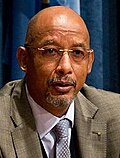| Prime Minister of the Republic of Niger | |
|---|---|
| Premier ministre du Niger | |
 | |
| Government of Niger | |
| Type | Head of government |
| Member of | Cabinet of Niger |
| Seat | Niamey |
| Appointer | President of Niger |
| Formation | 24 January 1983 [note 1] |
| First holder | Mamane Oumarou |
 |
|---|
| Judiciary |
This is a list of prime ministers of Niger since the formation of the post of Prime Minister of Niger in 1983 to the present day.
Contents
- Position under presidential system (2009–2010)
- List of officeholders
- Timeline
- See also
- Notes
- References
- External links
A total of fifteen people have served as Prime Minister of Niger (not counting one acting prime minister). Additionally, three persons, Mamane Oumarou, Amadou Cissé and Hama Amadou have served on two non-consecutive occasions.
The current prime minister of Niger is Ali Lamine Zeine, who was appointed by the National Council for the Safeguard of the Homeland led by General Abdourahamane Tchiani on 8 August 2023, [1] following a coup [2] [3] that overthrew President Mohamed Bazoum and the government of Prime Minister Ouhoumoudou Mahamadou.










